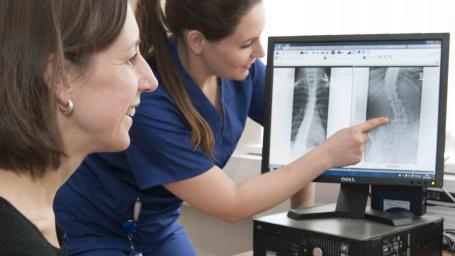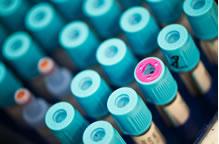Breast Care Current Research
The Breast Care Centre at NBT provides people at risk of developing breast cancer, excellent patient centered care and the opportunity to participate in research.
The centre has had a successful research team in place for a number of years delivering complex interventional studies. Please speak to the person treating you to find out if there is a research study that may be able to help you.
Current Studies:
PROSPECTS
The accuracy of two view digital x-ray mammography (2DDM) in breast cancer screening is limited because of superimposition of normal breast structures onto a two dimensional image. Mammography signs of breast cancer may be obscured, particularly in women with dense glandular breast tissue, resulting in delay in diagnosis of cancer. Interval cancer data shows that up to 4000 women per annum (2.88 per 1000 screened) are diagnosed with breast cancer in the interval between screens. Conversely, superimposition of normal tissues may produce features on mammography which are suspicious for cancer and lead to unnecessary recall for further diagnostic tests.
Digital Breast Tomosynthesis (DBT) is an x-ray mammography technique which involves acquiring multiple low dose projection images over a limited angular range (less than 50 degrees). These projection images are reconstructed into a set of images consisting of parallel planes, typically 1mm apart throughout the breast, and provide three dimensional information to the film reader. A synthetic 2D mammogram (S 2D) has been developed using the data from the reconstructed DBT images.
Studies of DBT + 2DDM in screening have shown increased invasive cancer detection rates and lower false positive recall rates.There may be increased costs related to the technology and reading times.
The aim of this trial is to measure the impact and cost-effectiveness of DBT + 2DDM or S 2D in routine screening compared to standard 2DDM.
100,000 women will be recruited using NHS screening sites with DBT mammography equipment. At each site, through a clinic randomisation process, half the trial participants will undergo standard 2DDM (the control group) and half will undergo 2DDM + DBT (the intervention group). All cases will be double read - in the intervention group, one read will be DBT + 2DDM, and one read will be DBT + S 2D. Arbitration or consensus will be used for reader 1/2 discordance.
Project Details
Principal Investigator: Dr Alexandra Valencia
Planned End Date: 31/03/2025
Local Ref: 4441
SMALL TRIAL (v1.0)
Open surgery versus minimally invasive vacuum-assisted excision for small screen-detected breast cancer – a phase III randomised multi-centre trial
The SMALL study is a research study which will help experts learn whether some women with small breast cancers, which are at low risk of spreading can be safely treated by removal of the cancer using a biopsy needle (under a local anaesthetic) instead of an operation.
The SMALL study will compare open surgery with a minimally invasive technique called vacuum-assisted excision (VAE) for the treatment of small breast cancers found at breast screening. Such small breast cancers have usually been treated with open surgery. The 2012 UK Breast Screening Review showed that breast screening does save lives, but that many women may be having more treatment than is necessary for their breast cancer. Also, experts do not currently know how open surgery compares with other safe and effective methods to remove small breast cancers. We want to find out what the best treatment is for women like you, so that in future we can only operate on those women who really require surgery. We aim to do this by comparing open surgery with VAE. VAE is widely used in the Breast Screening Programme and has been successfully used instead of an operation to removal small benign tumours in the breast. Based on this, in the SMALL study we would like to find out if VAE (which involves the use of a biopsy needle to remove the cancer) will be as effective as an open operation.
A benefit from taking part in this study is that you will provide information that will help doctors change and improve the way breast cancer is treated in the future. Some women may be able to avoid unnecessary breast surgery in the future as a direct result of the knowledge gained from you taking part in this study.
Project Details
Principal Investigator: Miss Shelley Potter
Planned End Date: 30/06/2025
Local Ref: 4432
ATNEC
Breast cancer sometimes spreads to other areas of the body via the lymphatic system. The first place that cancer cells travel to is the armpit (also known as the axilla). Chemotherapy can be given as a first treatment to target these cells and reduce cancer in the armpit before surgery. This is called neoadjuvant chemotherapy.
After chemotherapy, further treatment to the armpit (either surgery or radiotherapy) is usually offered to everyone. This extra armpit treatment can cause troublesome side effects such as lymphoedema (arm swelling) and shoulder problems.
Sometimes neoadjuvant chemotherapy works so well that it removes all cancer cells in the armpit.
The ATNEC study is looking at whether, in these cases, further armpit treatment is needed.
Project Details
Principal Investigator: Miss Shelley Potter
Planned End Date: 20/12/2025
Local Ref: 4867
EndoNET
This randomised controlled trial; patients are allocated by chance to one of two arms, which determines their treatment schedule. Hormone therapy is usually started after surgery. However, all participants in both trial arms will start hormone treatment (letrozole, anastrozole or exemestane) on joining the trial and prior to surgery. Therefore, they may have the opportunity to start treatment with hormone therapy before they normally would.
Participants in both arms have hormonal treatment for the same total length of time within the trial, but it is the timing of the surgery that differs. The type of surgery all participants will have will be determined by them and their clinical team as part of standard clinical care. Arm 1 will have surgery within 2-4 weeks (up to 8 weeks permitted for trial purposes) of joining the trial; arm 2 will receive surgery after 6 months (+/-1 month) of NET. Participants in arm 2 will receive an ultrasound (USS) scan at 3 months and 5 months to closely monitor their response to this hormone therapy prior to their surgery.
The overall aim is to evaluate whether 6 (+/-1) months of NET reduces surgical burden resulting in better HRQoL over 15 months and higher rates of breast conservation surgery (BCS) for post-menopausal women with ≥15mm (T1-3), strongly ER+, HER2- invasive breast cancer who do not require chemotherapy.
Project Details
Principal Investigator: Miss Shelley Potter
Planned End Date:28/02/2027
Local Ref (R&D no):5176
SWEET
Many women are prescribed hormone therapy following diagnosis and hospital treatment for breast cancer. Hormone therapy significantly reduces the chances of breast cancer returning. Usually, women are recommended to take hormone therapy, in the form of a daily tablet, for several years. However, we know that some women either do not take this medication everyday as prescribed or sometimes stop taking it all together (known as “poor adherence”); this can increase their risk of breast cancer returning.
SWEET have developed a support package (called HT&Me) which aims to encourage and support women to take their hormone therapy as prescribed, and hopefully reduce the risk of breast cancer returning.
The purpose of the study is to investigate whether the HT&Me support package can improve hormone therapy adherence, and quality-of-life when compared to the standard NHS follow-up care offered in your hospital right now.
Project Details
Principal Investigator: Miss Shelley Potter
Planned End Date: 31/12/2025
Local Red (R&D no): 5500
SIMBAR
The overall purpose of the research is to find out if using a technique called Laser Speckle Imaging (LSI) during surgery for breast reconstruction, can help with surgical decision making. We hope that this will result in significantly fewer complications, and any that do occur after surgery will be much less severe.
This research study is a feasibility study and will include a limited number of women, so we can evaluate the design of the study and whether it is acceptable to women. This will help to design a full-scale clinical trial in the future, and to discover whether this proven technique called LSI is useful in this particular operation. If fewer women are affected by complications and do not need further surgery, the benefit to patients is better quality of life. The benefits to the NHS and society will be cost savings on surgery, drugs, and the other costs associated with complications.
Project Details
Principal Investigator: Miss Philippa Jackson
Planned End Date: 01/04/2025
Local Red (R&D no): 5645
Take Part in Research

Become one of the thousands of people taking part in research every day within the NHS.
About Research & Development

Find out more about our research and how we're working to improve patient care.
Contact Research
Research & Development
North Bristol NHS Trust
Level 3, Learning & Research building
Southmead Hospital
Westbury-on-Trym
Bristol, BS10 5NB
Telephone: 0117 4149330
Email: research@nbt.nhs.uk

